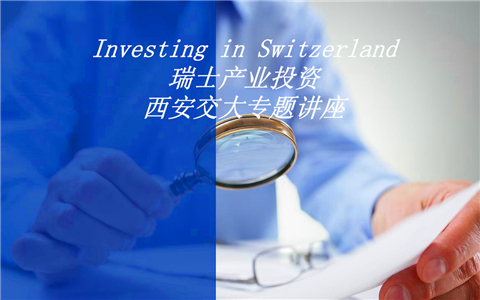-
 中国工商银行ICBC苏黎世分行第二届人民币论坛圆满举办
中国工商银行ICBC苏黎世分行第二届人民币论坛圆满举办
中国工商银行ICBC苏黎世分行第二届人民币论坛圆满举办 全球最大的银行——中国工商银行(ICBC)苏黎世分行,坐落于瑞士最奢华的购物地标:班霍夫大街(Bahnhofstrasse)之上、一栋曾归属于瑞士信贷(Credit Suisse)的圆顶大厦之中,其室内设计与施工皆由中瑞合资的EXH-印西河事务所负责。最突出的亮点是:从大街上就能眺望到董事会议室天花板上的 ICBC 巨型发光 Logo。中国工商银行希望自己的品牌 ICBC 能够被大众看到,但瑞士市政局的规定意味着这座历史遗产型建筑的外观不能被篡改。因此,创意自照明合作伙伴
Zumtobel 定制的发光 Logo
就被安在了会议桌的上方。“从班霍夫大街上就能抬头望见,有时候照明可以成为整个设计构想的灵感来源。”建筑师张西如是说。 继2018年第一届人民币论坛获得参会嘉宾的热烈反响之后,2019年11月7日,中国工商银行苏黎世分行以“新时代,新机遇,人民币国际化与投资中国”为主题,在班霍夫大街上的分行大厦内,成功地举办了第二届人民币论坛活动(2nd RMB Forum)。 工行ICBC瑞士苏黎世分行 第二届人民币论坛的致辞/演讲嘉宾 会后的专题交流气氛热烈,专家们就客户所关注的投资主题,与现场的各国金融人士进行了深入交流。瑞士雷梭勒家族办公室的两位同仁(下图左一、左三),也受邀拨冗参加,共襄中瑞两国的顶尖投资盛会,并搜集国际市场第一手的财经资讯和业界精英人脉,供雷梭勒的VIP客户们研究分享。 该文章为搜瑞士网站原创,部分图片摘引自网络媒体的公开资源,如需转载,敬请注明出处。 Sooswiss为您提供 瑞士方向私人管家式的定制服务: 1)家族传承 2)财富管理 3)瑞士投资 4)居留计划 5)税务优化 6)家族治理 更多资讯请登录网站 www.sooswiss.com
-
 《传承宝典》29——独立的财富管理 & 受托人的作用 (下篇)
《传承宝典》29——独立的财富管理 & 受托人的作用 (下篇)
《传承宝典》29 独立的财富管理 & 受托人的作用 (下篇) 理查德是伦敦Stonehage Fleming家族办公室的投资管理公司总裁。作为一名投资分析师和基金经理,他为集团工作了25年。2000年,他被邀请创建Fleming Family & Partners的资产管理部门,并成为了该FF&P资产管理有限公司的CEO和总裁。 一. 选择外部顾问 首先,有必要界定所需咨询的范围。受托人是在就某一特定事项寻求需要非常专业知识的具体建议,还是在寻求一种更普遍宽泛、更长期的关系?如果是后者,它是覆盖整个信托资产范围的财富管理,还是仅对已上市投资和基金组合的管理?受托人还希望确保顾问有动力、有能力为客户的最佳利益行事,并了解更广泛的情况,而不是让他们的判断受到其他因素的曲解,包括他们自己的薪资、抱负或根深蒂固的专业惯例。 1.顾问的声誉和地位如何,受托人对他们的了解程度如何,以及他们是否从遇上类似情况的其他客户那里得到过正面的推荐? 2.他们是否与潜在客户“沟通”,了解他们的问题并解决他们的担忧,而不是提供标准的“销售说辞”或者泛泛的“解决方案”? 3.他们是否表现出在所有相关专业领域中的能力,而不偏向于自己的专业领域? 4.他们的商业模式是否符合客户的长期利益,而不是基于提供建议的个人短期报酬之厚薄? 二. 一个整体化的方法 许多客户和信托受益人寻求对其财富进行整体化管理的方法,这意味着确保客户的金融财务皆通过单一个人或团队进行管理,同时深入了解每个客户家庭、他们的财富和其他情况。这一个人或团队,必须具有足够的知识和经验来处理其事务的所有方面,并在需要时获得相关专家的信息和意见。人们经常使用“协调人”(coordinator)这个词,但这个词严重低估了整体化财富管理机构所扮演的角色,尤其是那些处理跨多个司法管辖区、拥有多种利益的复杂性客户的机构,它们通常会运用许多迥异的结构持有各类资产。 “整体化”理财经理的工作与其说是把客户介绍给专家,不如说是领导和管理团队,推动决策的过程。他或她所扮演的角色与流程如下: • 站在客户的立场,深入了解他们的家庭情况,他们的态度和关注,以及他们的财务和商业性事务。• 帮助客户制定和概述其财富的战略、目的和目标,确保其能对后代有所益处。• 确定需要采纳的关键要点和关键决策,以及可能需要专家建议的领域。• 确定最优秀、最合适的专家,向他们简要汇报,并与他们合作,以得出符合整体情况的结论。• 将建议整合到更广泛的决策框架中,其中可能包括来自其他各种专家的建议,其中的一些可能相互冲突。• 根据商定的战略和目标,管理日常的执行和报告。 很明显,客户的事务越复杂,对于理财经理的经验和判断力的要求就越高,他/她需要充分了解所有相关的领域,还需要拥有以往服务类似客户的大量经验,这样就可以利用所有这些实际经验,来覆盖各类家庭问题以及技术资源。这种经验不仅来自他们曾服务的客户数量,还来自于他们曾参与的广度和深度。那些提倡整体化理财方法的人会提倡:理财经理需要支持内部专家,他/她与专家们保持日常接触,来作为一个“团队”一起工作。这种更加无缝的方法对客户来说是一种更好的体验,减少了与多种不同领域顾问打交道的需要。对客户来说,最好的解决方案不是理论上独立的完全外包模式,而是在内部和外部的顾问建议之间找到正确的平衡。这将包括考虑咨询提供者的业务模型的可行性。整体化方法的另一个优点是:当需要时,咨询提供者具有专家知识和丰富经验,来识别合适的外部专家,并且有足够的业务来分配,他们可以与其希望利用的大多数专家进行定期联系。所有的这些考虑,都与受托人密切相关,无论是在选择外部顾问方面,还是在考虑他或她在自己的团队中所需的专业知识的范围方面。 三. 结论 由于受托人的特殊地位,他们有特殊的责任来维护他们的独立性和管理任何利益冲突。这将包括在内部和外包的建议和服务之间找到适当的平衡,以服务于他们的信托受益者的最大利益。毫无疑问,外包是正确的,因为外部供应商可以更好地满足信托的需要,但在许多情况下,内部解决方案是更好的选择。做出判断和做出重大决定是受托人的工作,他们应该被期望具备专业知识、经验和能力,并在不过度依赖第三方顾问的情况下履行其职责。 English Version Independent Wealth Management and the Role of the Trustee (II) Richard is Chairman of Stonehage Fleming Investment Management in London. Following 25 years with Flemings in London and New York as an investment analyst and fund manager, he was invited to set up the asset management arm of Fleming Family & Partners in 2000, becoming CEO and subsequently Chairman of FF&P Asset Management Limited. 3.SELECTING AN EXTERNAL ADVISER Firstly, it is necessary to define the scope of the advice required. Are the trustees looking for specific advice on a particular matter requiring very specialist knowledge, or is it a more general, long-term relationship? If the latter, is it wealth management covering the whole spectrum of the trust assets or is it simply the management of a portfolio of quoted investments and funds? The trustees will also wish to ensure the adviser is motivated and competent to act in the client’s best interests, and to understand the broader picture, rather than having their judgments distorted by other factors, including their own remuneration, ambition or entrenched professional practices. 1. What is the reputation and standing of the advisers, how well do the trustees know them and have they come with good recommendations from other clients in similar situations? 2. Do they ‘connect’ with the underlying clients, in terms of understanding their issues and addressing their concerns, rather than delivering a standard ‘sales pitch’ or solution? 3. Do they demonstrate competence in all the relevant areas of expertise, without bias towards their own areas of specialism? 4. Is their business model aligned to serving the long-term interests of the clients, rather than the short-term remuneration of the individuals providing the advice? 4.THE CASE FOR A HOLISTIC APPROACH Many clients and trust beneficiaries seek a holistic approach to the management of their wealth, which means ensuring that the clients’ financial affairs are managed through a single individual or team, with a deep understanding of each client family, their wealth and other circumstances. This individual or team must have the knowledge and experience to cover all aspects of their affairs, with access to information and views from relevant specialists where required. The word co-ordinator is often used, but this word grossly underestimates the role played by a holistic wealth manager, particularly one who handles complex clients with multiple interests across a variety of jurisdictions, often holding disparate assets through a number of different structures. The job of the ‘holistic’ wealth manager is not so much to introduce clients to the experts, but to lead and manage the team and drive the decision making process. His or her role includes the following: • Standing in the shoes of the clients, by developing a deep understanding of their family circumstances, their attitudes and concerns, as well as their financial and business affairs. • To help the clients develop and outline a strategy, purpose and objectives for their wealth, ensuring it serves a useful purpose for successor generations. • To identify key issues and key decisions which need to be taken and areas where specialist advice may be required. • To identify the best and most appropriate specialists, brief them, and work with them to reach conclusions which fit the overall context. • To integrate the advice into a wider decision making framework, which may include advice from a variety of other specialists, some of which may be conflicting. • To manage day to day execution and reporting, in accordance with the agreed strategy and objectives. It will be apparent that the more complex the clients’ affairs, the greater the demands on the experience and judgment of the wealth manager, who needs sufficient understanding of all relevant areas. He or she will also need significant experience of similar clients, so that he can draw on all those practical experiences, covering family issues as well as technical input. This experience comes not just from the number of clients they have served, but from the breadth and depth of their involvement. Those who advocate the holistic approach would argue that the wealth manager needs supporting specialists in-house, with whom he or she has day to day contact, working together as a ‘team’. This more seamless approach is a better experience for the client, reducing the need to engage with multiplicity of different advisers. The best solution for the client is not the theoretical independence of a totally outsourced model, but finding the right balance between in-house and external advice. This will include consideration of the viability of the provider’s business model. A further advantage of the holistic approach is that the provider has both the expert knowledge and experience to identify the right external specialists, when required, and sufficient business to allocate that they are in regular contact with most of the specialists they may wish to draw upon. All these considerations are highly relevant to the trustee, both in selecting external advisers and in considering the extent of expertise he or she needs within their own team. 5.CONCLUSION Because of their special status, trustees have a particular responsibility to preserve their independence and to manage any conflicts of interest. This will include finding the right balance between in-house and outsourced advice and services, to serve the best interests of their beneficiaries. It is unquestionably right to outsource where external providers can clearly better meet the needs of the trust, but there are many circumstances where an in-house solution is preferable. It is the job of trustees to make judgments and take big decisions, and they should be expected to have the expertise, experience and capability to fulfil their responsibilities without excessive reliance on third party advisers. <Fin> Sooswiss为您提供 瑞士方向私人管家式的定制服务: 1)家族传承 2)财富管理 3)瑞士投资 4)居留计划 5)税务优化 6)家族治理 更多资讯请登录网站 www.sooswiss.com
-
 北大汇丰商学院讲座: 家族信托实操案例解析
北大汇丰商学院讲座: 家族信托实操案例解析
北大汇丰商学院讲座: 家族信托实操案例解析 2019年11月1日,北京大学汇丰商学院风险管理与保险研究中心(RMIRC)于北大汇丰商学院大楼401,成功举办了北大汇丰另类投资系列讲座《家族办公室:家族信托实操案例解析》。 嘉宾介绍 孙晋玲女士,瑞士雷梭勒家族办公室(La Soleille)中国区CEO、瑞士联邦政府“中瑞关系促进杰出使者”、瑞士大使馆“中瑞投资者网络”创始成员,瑞士纳沙泰尔州政府大使勋章获得者。RMIRC主任雎岚教授、RMIRC学术主任涂志勇教授、瑞士雷梭勒家族办公室中国区经理魏强先生出席了讲座。 讲座内容 首先,孙女士以一组数据引出为何家族传承受到越来越多人的关注。据不完全数据显示,全球家族企业的平均寿命只有24年。其中,只有约30%的家族企业可以传到第二代,到第三代仍然保有财富与影响力传承的不足8%。而在中国,对于绝大多数家族企业来说,三代以内的传承可能不到5%。接下来,她阐述了什么是传承。简单来说,它包括四大部分,也就是:财富、企业、成员和家族。想要实现家族传承,就一定离不开Take-on阶段和On-going阶段。在Take-on阶段,往往要花费很长的时间进行调研,而这一步的铺垫将会直接影响接下来的每一步发展。具体来说,包括家族宪章的制定、信托设计、资产的梳理和决策与监督。而On-going阶段,也就是基于前期Take-on阶段后的实操阶段,想要保证实施的有效性,就需要专业的管理团队进行治理,可靠的监督机制来及时纠错。同时,也很有必要去应对趋势做出调整及对风险的管理。 随后,孙女士分享了很多有趣的案例。她通过“香港法院跨管辖区击穿泽西岛信托”的案例,揭示了Take-on阶段中的结构规划非常重要,它犹如保证家族传承正常运行的发动机,一旦失误,将会造成不可挽回的后果。想要保证资金安全,离岸信托并不是永远的安全岛。 孙女士又以另一个典型案例,强调了监督机制和专人治理的不可或缺。美国历史上,曾位居富豪榜第4名的纽约地产之王——John Jacob Astor
I,这个家族的财富(以当今美元估值为1101亿),因为坚守其“若非为了再投资,不可出卖家传地产”的家训而成功传到了第四代。然而,因为缺乏长效的监督机制和专业团队的治理,这份惊人而庞大的家业到了第五代就逐渐败落,令人唏嘘不已。 她还向我们揭开了Brenninkmeijer家族迄今六代传承的秘密,即让所有家族成员均能够参与到管理当中。她提到,仅为这个家族提供家族传承服务的专业团队人数就高达200多人。在这个家族中,每年都会组织全部家族成员一同旅游,促进感情,和睦相处;通过游戏和测试,内部选拔具有领导力的家族成员,参加严格的系统化培训。Brenninkmeijer家族会给年轻人更多选择的机会,譬如在30岁委以重任,担任区域/部门负责人;而在50岁退休,通过带教方式培养下一代新人。在分享的尾声,孙女士为我们带来了精辟的总结。家族信托无论从设计到实施,都是一个极其复杂的系统工程,需要专业团队的全程支持。家族传承始终需要关注两个维度:一是人,包括家族成员与家族;二是钱,包含家族财富与企业。在人的方面,包括接班人的培养,通过家族大会来促进家庭成员和睦;在钱的方面,包括设定资产管理目标和规划、选择专业资产管理人、定期回顾资产表现以及应对新机会和风险的机制。只有通过制定家族宪章,选拔与教育下一代接班人,保证家庭内部的融洽和睦,才能促进家族兴旺;也只有通过合理的设计,可靠的监督,才能保证财富的传承。参与讲座的听众们聚精会神,仔细聆听,在互动问答环节中就家族传承相关问题,向孙女士进行了请教,嘉宾都一一给予了详细解答。在热烈的掌声中,讲座圆满结束。雎岚教授为孙晋玲女士赠送礼物,以表感谢,嘉宾们合影留念。 该文章转载自雷梭勒家族办公室,如有侵权,敬请告知删除。 Sooswiss为您提供 瑞士方向私人管家式的定制服务: 1)家族传承 2)财富管理 3)瑞士投资 4)居留计划 5)税务优化 6)家族治理 更多资讯请登录网站 www.sooswiss.com
-
 《传承宝典》28——独立的财富管理 & 受托人的作用 (上篇)
《传承宝典》28——独立的财富管理 & 受托人的作用 (上篇)
《传承宝典》28独立的财富管理 & 受托人的作用 (上篇) 理查德-菲兹兰-霍华德 英国伦敦Stonehage Fleming集团合伙人-投资总裁 理查德是伦敦Stonehage Fleming家族办公室的投资管理公司总裁。作为一名投资分析师和基金经理,他在伦敦和纽约的Flemings集团工作了25年。2000年,他被邀请创建Fleming Family & Partners的资产管理部门,并成为了该FF&P资产管理有限公司的CEO和总裁理查德在牛津大学基督圣体学院研读历史。他是Gabelli Value Plus+ 信托公司的董事。他还是Dulverton信托基金、军事学院信托基金和圣约翰关怀信托基金的董事;以及牛津大学基督圣体学院和马耳他主权军事教团信托基金投资委员会的成员一个先决条件是——受托人必须在所有方面都独立,并且只根据受益人在信托契约中所确定的目标之需要来行事。 当然,“独立性”是金融服务中常用的一个词,用来界定顾问与客户之间的关系,各种监管制度旨在确保顾问不偏袒自己的利益。对于受托人来说,独立还有一个额外的、至关重要的方面,即独立于所有信托受益人之间,不允许自己受到一个或多个家族成员的过度影响,从而损害他人的利益。 一. 受托人的责任 受托人的职责是作为一位“谨慎的商人”,代表受益人来管理资产。当然,这不仅适用于投资组合,还适用于信托持有的所有资产,如:家族企业、直接持有的投资和企业、房地产、艺术品、休闲资产和许多其它资产。他必须在顾及所有受益人利益的情况下,按照有关信托契约的条款履行职责。实际上,他可能经常需要平衡不同受益人之间的利益冲突,并调和截然不同的观点。毫无疑问,受托人的职责需要非常广泛的知识、经验和技能,以便做出正确的决定,同时维护家族的和谐。例如,几乎所有的受托人都对投资有一定的了解,他们利用这些了解来挑选信息并汇报给外部顾问,再根据他们的建议进行解释和采取行动。事实上,很明显,即使在投资管理完全外包的地方,关键的投资决策,尤其是资产配置,也会受到受托人观点的强烈影响,这是正确的。受托人的影响对于投资业绩和风险的影响,完全有可能远远超过专业投资经理的决定。 更有争议的是,负责家族企业的受托人可能不得不在继续拥有该企业与考虑分散单一业务风险的责任之间进行调和。这意味着需要对企业进行持续的监控,并拥有知识、技能和勇气来提议进行重大审查,而这种审查很可能不受家族领导者的欢迎。这同样适用于其他资产,比如:直接投资、房地产和艺术品。受托人可以随时咨询专家的意见,但他需要拥有基本的理解和经验才能知道何时需要这样的建议。他需要找到合适的专家并向他们汇报情况,并在做出决定时正确地使用这些建议,这通常出现在与客户的家族成员进行讨论或谈判之时。作为一个“谨慎的商人”,受托人需要具备多少知识才能履行这些职责?他或她如何运用这些知识?在他具备专业知识的情况下,他应该让外部顾问凌驾于自己的观点之上,还是应该在做出决定时只参考这些建议? 一些较大的信托公司认识到需要投资方面的专门知识,因此设立了专门的部门,以帮助作出资产配置方面的决定,并帮助挑选和监测最好的第三方投资管理公司。有些公司甚至聘用专家,在直接投资和企业交易、房地产和艺术品管理方面为客户提供支持。许多受托人也拥有重量级的内部法律专家团队。问题是在哪里划定出界限、以及在什么样的情况之下:对于受托人的独立性而言,必要的建议外包给第三方将是至关重要的,即便所适用的专业知识已存在于其内部? 二. 决定是否外包的关键因素 无论出于何种目的,在决定是否需要外部咨询时,信托受益人的利益是至高无上的。以下的清单可能会有所帮助: 1. 受托人是否真的拥有“内部”的独立专家,来为决策做出贡献?能否证明他与外部专家相比之高下? 2. 与其他外部顾问相比,对更广阔视角的理解是否让他们处于更有利的地位? 3. 便利性、成本效率或隐私等问题是否重要到足以在此成为一项因素? 4. 如果信托财产委托人和受益人,对于受托人比对于外部顾问或资产管理公司更有信心,那么其与委托人和受益人之间深厚和可信赖的关系是一项合理的因素吗? 5. 委托人和受益人的意见是否应在其他方面加以考虑?如果是,为什么——例如若是家族在某一特定领域已拥有专门知识的行家团队? 6. 就风险和可能导致结果的范围而言,决策的实质重要性是什么? 在理论上,例如:外包管理短期政府债券投资组合,甚至蓝筹股票(特别是如果他们所跟踪的指数相当密切)的需求,远不如外包管理对冲基金或私人股本投资组的需求来得强大,因为后者更多取决于经理人的判断和技能。同样,与使用特定的内部投资基金或产品相比,将资产配置和经理人的选择留在公司内部更容易找到理由。 English Version Richard is Chairman of Stonehage Fleming Investment Management in London. Following 25 years with Flemings in London and New York as an investment analyst and fund manager, he was invited to set up the asset management arm of Fleming Family & Partners in 2000, becoming CEO and subsequently Chairman of FF&P Asset Management Limited. Richard read History at Corpus Christi, Oxford. He is a Director of Gabelli Value Plus+ Trust plc. He is also a Director of The Dulverton Trust, The College of Arms Trust and the Orders of St John Care Trust; and a member of the Investment Committees of Corpus Christi College, Oxford, The Sovereign Military Order of Malta, and The Dulverton Trust. It is therefore a prerequisite that the trustee must be independent in all respects and act only in accordance with the needs of beneficiaries, with regard to the objectives defined in the trust deed. ‘Independence’, of course is a word commonly used in financial services to help define the relationship between adviser and client, with various regulatory regimes designed to ensure the adviser does not prefer his own interests. For a trustee, there is an extra and vital dimension to independence, which means being independent between all trust beneficiaries, not allowing himself or herself to be excessively influenced by one or more family members, at the expense of others. 1. RESPONSIBILITY OF TRUSTEES The duty of a trustee is to act as a ‘prudent man of business’ in managing assets on behalf of beneficiaries. This applies, of course, not merely to investment portfolios, but to all assets held in trust, such as family businesses, directly held investments and ventures, property, art, leisure assets and many others. He must exercise his responsibilities in accordance with the terms of the relevant trust deed, having regard to the interests of all the beneficiaries. Indeed he may often have to balance the conflicting interests of different beneficiaries and to reconcile sharply differing views. It goes without saying that trusteeship can demand an exceptionally broad range of knowledge, experience and skills, in order to make the right decisions, whilst maintaining family harmony. The prudent man of business will seek advice where required, but will take the ultimate decision as required by the trust deed. The question hence arises as to how much expertise a trustee needs in respect of the assets under their control, how they use that expertise and how they get paid for it. Nearly all trustees, for example, have some understanding of investments, which they use to select and brief external advisers and to interpret and act upon their recommendations. Indeed it is very clear that even where investment management is fully outsourced, key investment decisions, especially asset allocation, are strongly influenced by the views of the trustees and rightly so. It is entirely possible that the influence of the trustees will have far more impact on the investment performance and risks than decisions taken by the professional investment managers. More controversially, the trustee responsible for a family business may have to reconcile the continuing ownership of that business with the duty to consider the case for diversifying the risk of a single line holding. It implies a need for continual monitoring of the business and having the knowledge, skill and courage to call for a major review which may well be highly unpopular with family leaders. The same applies to other assets, such as direct investments, property and art. The trustee can always call in specialist advice, but needs the basic understanding and experience to know when such advice is needed. He needs to find and brief the right specialists, and to use the advice correctly in coming to a decision, often in discussion and perhaps negotiation with the client family members. Just how knowledgeable does a trustee need to be to discharge these responsibilities, as a ‘prudent man of business’ and how does he or she apply that knowledge? Where he has expertise, should he allow his own views to be overridden by external advisers, or should he merely take account of such advice in reaching a decision? Recognizing the need for investment expertise, some larger trust companies have established specialist units to help with asset allocation decisions and to help select and monitor the best third party investment managers. Some have gone even further in hiring specialists to support clients in direct investment and corporate transactions, in property and art management. Many trustees also have significant in-house legal expertise. The question is where to draw the line and at what point is it essential for trustee independence that the advice required is outsourced to a third party, even if suitable expertise exists in-house? 2. KEY FACTORS IN DECIDING WHETHER TO OUTSOURCE The assumption must be that, in deciding whether external advice is required, for whatever purpose, the interests of the trust beneficiaries will be paramount. The following check list may be helpful: 1.Do the trustees genuinely have independent expertise ‘in-house’ to contribute to the decision and can it be demonstrated that it compares with external specialists? 2.Does understanding of the wider perspective put them in a better position than other external advisers? 3.Are issues of convenience, cost efficiency or privacy sufficiently important to be a factor? 4.Is a deep and trusting relationship with the trust settlor and beneficiaries a legitimate factor, if they have more confidence in their trustees than an external adviser or asset manager? 5.Are there other respects in which the views of the settlor and beneficiaries should be considered and if so why – for example if the family has expertise in a particular field? 6.What is the materiality of the decision in terms of risk and range of possible outcomes? In theory, for example, the case for outsourcing management of an investment portfolio of short-term government bonds, or even of blue chip equities (especially if they track the indices quite closely) is much less powerful than the case for outsourcing the management of a portfolio of hedge funds or private equity,...

 中国工商银行ICBC苏黎世分行第二届人民币论坛圆满举办
中国工商银行ICBC苏黎世分行第二届人民币论坛圆满举办
 《传承宝典》29——独立的财富管理 & 受托人的作用 (下篇)
《传承宝典》29——独立的财富管理 & 受托人的作用 (下篇)
 北大汇丰商学院讲座: 家族信托实操案例解析
北大汇丰商学院讲座: 家族信托实操案例解析
 《传承宝典》28——独立的财富管理 & 受托人的作用 (上篇)
《传承宝典》28——独立的财富管理 & 受托人的作用 (上篇)